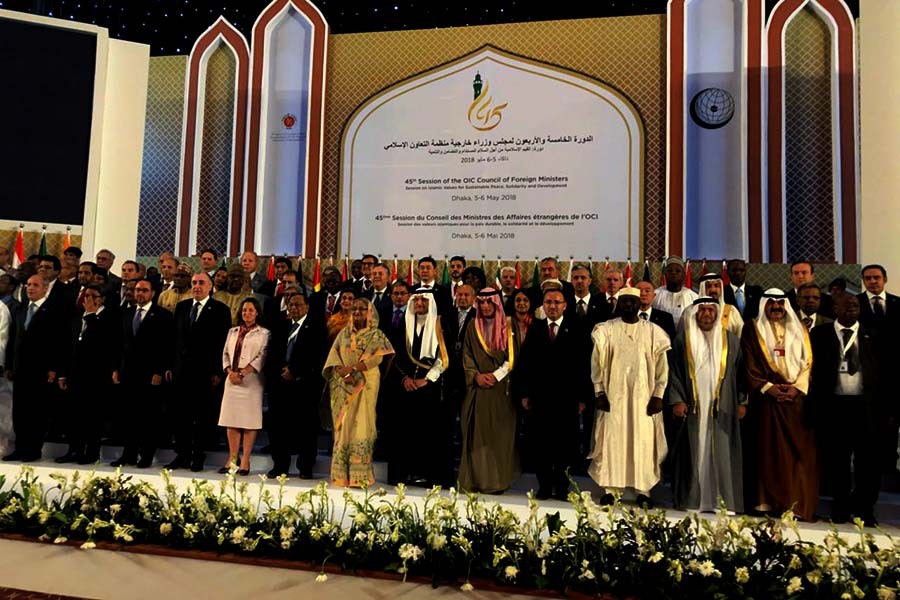Established in Rabat, Kingdom of Morocco, on September 12, 1969 with fifty-seven member-states, the Organisation of the Islamic Conference (OIC) is an inter-governmental organisation, having its Secretariat in Jeddah. Theoretically, it is a "collective voice of the Muslim world with an estimated population of over 1.6 billion.
One of the most important Charter objectives of OIC is to protect and strengthen solidarity and cooperation among the Muslim states in politico-economic, social, cultural, and scientific fields for promoting international peace and unity. The OIC is the second largest inter-governmental organisation after the United Nations (UN).
Hosted by Bangladesh, the 45th annual meeting of OIC Council of Foreign Ministers (CFM) took place in Dhaka on May 5-6. As many as 22 foreign ministers, 13 state and deputy ministers, six foreign secretaries from 53 member-states and three observer-status states attended the meeting. It may be mentioned that Bangladesh hosted OIC-CFM meeting for the first time in 1983.
At the inaugural session of the May 5-6 meeting of OIC-CFM, Prime Minister Hasina urged the OIC "to stand firm beside the Rohingya refugees". She added that OIC could not overlook the Rohingya crisis.
The OIC-CFM declared that the violence against the Rohingya Muslims constitutes a "blatant violation" of international law. The OIC adopted a 39-point declaration, which stated "deep concern" over the brutal oppression by the Myanmar's military junta. The OIC maintained that Myanmar must be held answerable for the violation of human rights against the Rohingya Muslims.
The unprecedented military crackdown and senseless killing was launched between October 2016 and late-August 2017 resulting in a carnage of thousands of Rohingyas and displacement of over one million Rohingya refugees to Bangladesh. This exceeds the UN estimated (2018) total population of Bhutan's 815, 316 people. Safe and prompt repatriation of displaced Rohingyas have not commenced until now despite an agreement reached between Bangladesh and Myanmar on November 23, 2017 for their safe and voluntary return to the Rakhine state of Myanmar, where they had been living for centuries.
The UN has termed Myanmar's atrocities against Rohingya Muslim community as an example of "textbook ethnic cleansing". The United States of America also drew a comparable conclusion. The Human Rights Watch alleged that the Myanmar's ruthless military Junta persecuted and operated like wartime Japanese "sanko seisaku" policies of "kill all, burn all, and destroy all".
Mr. Andrew Gilmour, the UN Assistant Secretary-General for Human Rights, said on March 06 at the end of a four-day visit to Bangladesh, "The ethnic cleansing of Rohingya from Myanmar continues. I don't think we can draw any other conclusion from what I have seen and heard in Cox's Bazar,"
For obvious reasons, the Rohingya crisis dominated this year's OIC CFM whose theme was "Islamic Values for Sustainable Peace, Solidarity and Development". A 53-member delegation of the OIC visited the Kutupalong refugee camps in Cox's Bazar on March 04 to see for themselves the despicable conditions of the Rohingya refugees.
The OIC had earlier requested the UN and other aid-agencies to protect the unfortunate Rohingya refugees from the looming risks of landslides and flooding during the monsoon season. Earlier, the OIC supported the UN to pass a resolution against the brutal Myanmar regime.
The OIC also called for immediate implementation of the wide-ranging recommendations of 2017 Kofi Annan Commission including restoration and renewal of full citizenship of the Rohingyas. The Myanmar government at that time made a commitment that it would implement the Commission's recommendations. But de facto leader Suu Kyi's government of Myanmar had broken that assurance.
The OIC is yet to resort to other effective strategies to prevent Myanmar, a predominantly Buddhist state, from ethnic cleansing of the Rohingya Muslims. The OIC Secretary-General Dr. Yousef bin Al- Othaimeen admitted that OIC has failed to play a proactive and strong role in the Rohingya crisis. Dr. Yousef also urged the well-off nations of the OIC to extend humanitarian aid for the Rohingya refugees sheltered in awful conditions in makeshift camps in Cox's Bazar.
The OIC's role on the protracted Rohingya conflict up until now has been limited to only criticism and condemnation through declarations and resolutions by its seemingly non-assertive frail leaders. For example, the OIC condemned Myanmar for its ruthless atrocities against the Rohingyas at least 5 times during February 2017- September 2017 and took resolutions only. It has not been more assertive in isolating and punishing Myanmar by tough economic sanctions.
The Rohingya tragedy is likely to continue because Myanmar is still pursuing hard-line policy along with hitches about agreed safe and voluntary return of the refugees to an UN-controlled safe zone in the Rakhine state. Therefore, the OIC bloc should seriously consider sheltering some of the Rohingya Muslims refugees in their counties for two reasons: (a) to save the Rohingyas from imminent demise, and (b) to reduce massive economic pressure and security threat of Bangladesh.
In addition, mobilising substantial foreign aid by the well-off OIC members is required to protect the "right to life", dignity, and security of the Rohingya Muslim community.
The OIC must make concerted efforts to protect and strongly support the Rohinghya Muslim refugees. In fact, the OIC should demonstrate strong leadership and pursue further interventions, robust politico-economic and diplomatic offensive against the de facto leader Suu Kyi's Myanmar which has been ignoring repeated criticisms and demands of the international communities and human rights organisations for ending military cruelty and genocide against the Rohingya Muslims.
Dr. Kamal Uddin Ahmed is a former Professor and Chairman, Department of Political Science at the University of Dhaka, Bangladesh.


